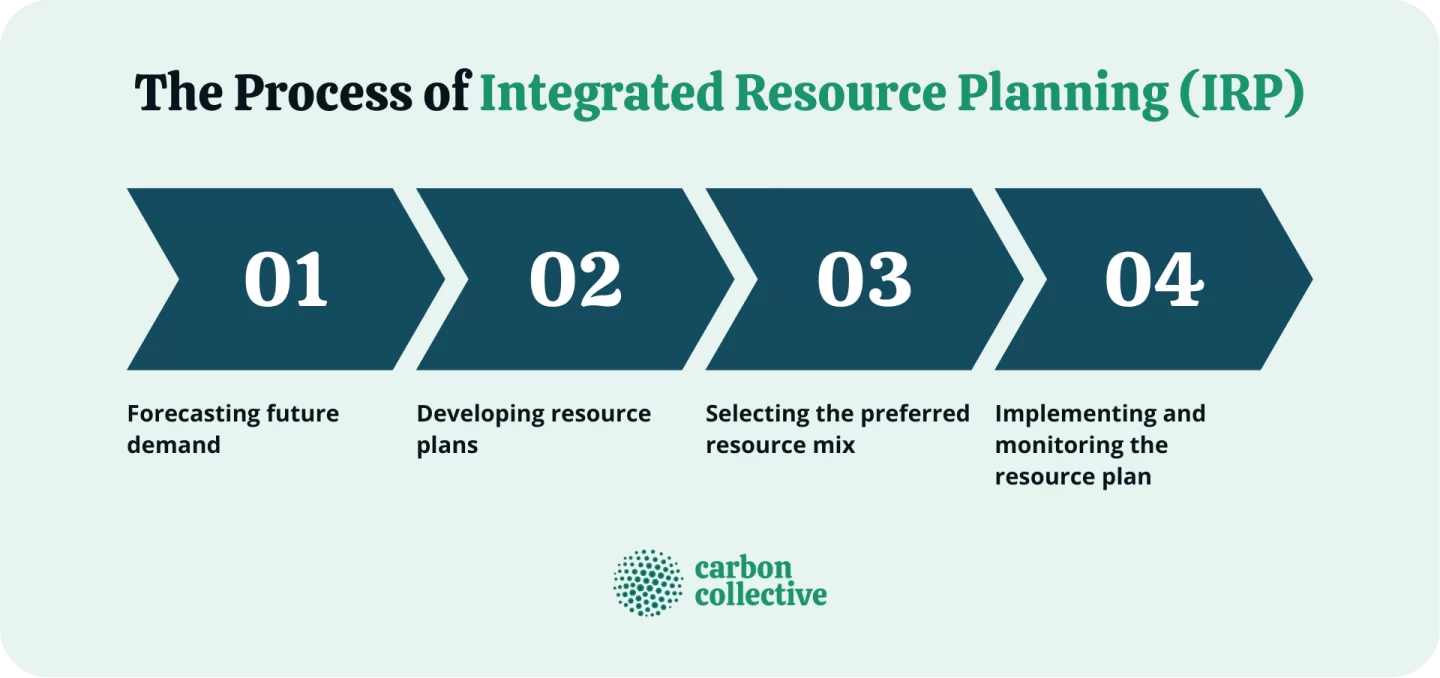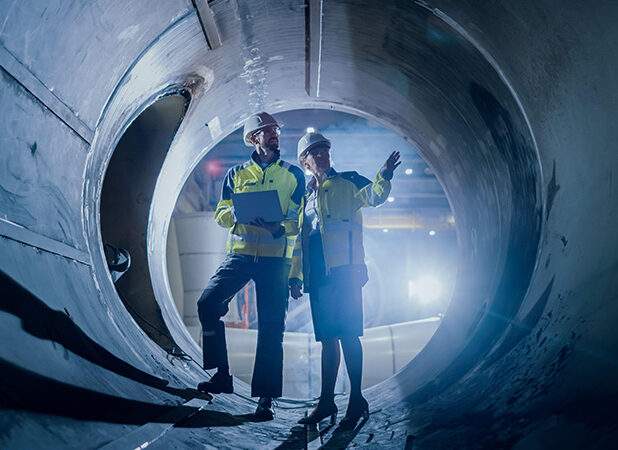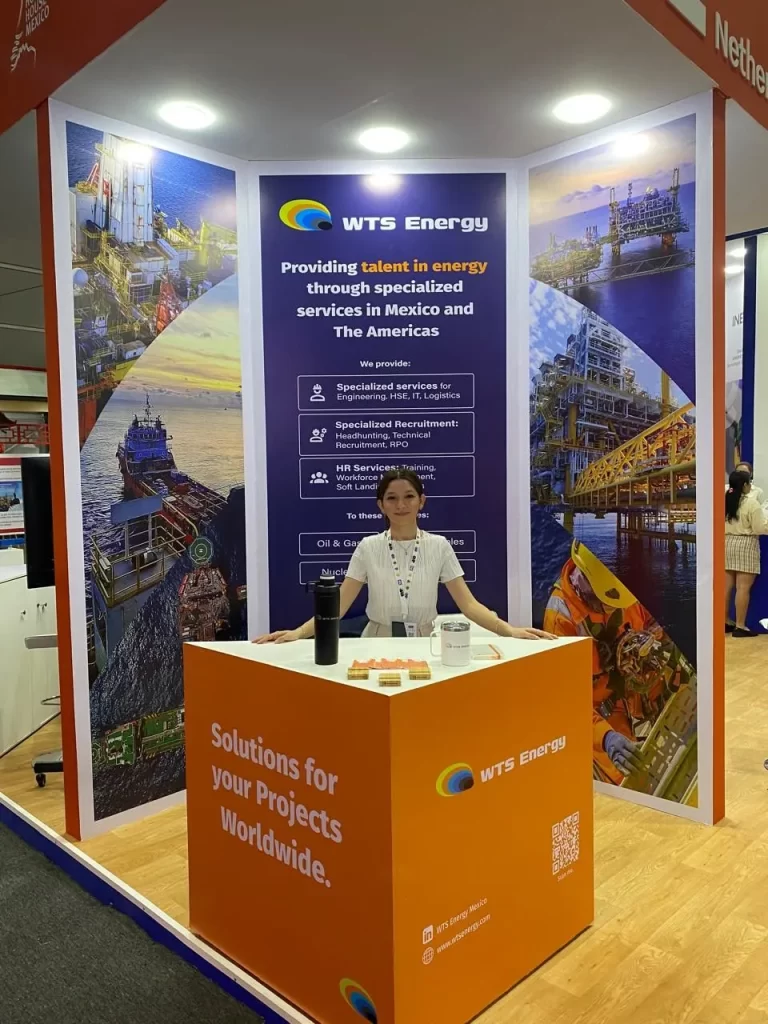Integrated Resource Planning (IRP) is a strategic approach to energy management. It focuses on the systematic development of plans for the efficient and sustainable use of energy resources. It encompasses various factors such as demand forecasting, technology assessment, and environmental impact considerations. In essence, IRP aims to optimize the allocation and utilization of energy resources. This, to meet present and future energy needs while minimizing environmental impacts.
Components of Integrated Resource Planning

The process of Integrated Resource Planning. Source.
Integrated Resource Planning (IRP) helps to predict future energy needs, evaluate the suitability of various technologies, and assess the environmental effects of energy production. The following components, together, ensure that energy resources are utilized efficiently and responsibly.
Demand Forecasting
Demand forecasting is a crucial component of IRP. It involves predicting future energy needs based on factors such as population growth, economic development, and technological advancements. Accurate demand forecasting is essential for effective resource planning and allocation.
Technology Assessment
The IRP assesses various energy technologies to determine their suitability and viability in meeting energy demand. Factors considered include cost-effectiveness, reliability, scalability, and environmental sustainability of different energy technologies.
Environmental impact assessment
A crucial component of IRP. It has the goal of reducing the ecological impact of energy production and consumption. This includes analysing the environmental effects of various energy sources and technologies, such as greenhouse gas emissions, air and water pollution, and habitat destruction.
Benefits of Integrated Resource Planning (IRP)
Integrated Resource Planning (IRP) offers multiple benefits to users by ensuring more efficient, cost-effective, and environmentally sustainable energy management. It strategically aligns resource allocation with demand forecasts and technology assessments to optimize energy systems and reduce environmental impacts.
Optimized Resource Allocation
By analysing energy demand, technology options, and environmental considerations systematically, IRP helps optimize the allocation of energy resources, ensuring efficient and sustainable energy use.
Cost Savings
IRP can lead to significant cost savings by identifying the most cost-effective energy technologies and strategies for meeting energy demand. This includes investments in energy efficiency measures, renewable energy sources, and demand-side management programs.
Environmental Sustainability
IRP contributes to the transition to a more sustainable and environmentally friendly energy system by prioritizing environmental considerations in energy planning and decision-making. It promotes the adoption of renewable energy sources, energy efficiency measures, and other clean technologies to reduce carbon emissions and minimize environmental impacts.
Challenges in Implementing Integrated Resource Planning (IRP)
Implementing IRP presents several challenges, including the complexities of accurate demand forecasting, technology integration, and regulatory compliance. These obstacles require careful management to effectively balance resource efficiency with sustainable development goals.
Data Availability and Quality
One challenge in implementing IRP is obtaining and ensuring the quality of data needed for demand forecasting, technology assessment, and environmental impact analysis. Improving mechanisms for collecting, managing, and sharing data is essential for effective IRP.
Policy and Regulatory Frameworks
The success of IRP relies on supportive policy and regulatory frameworks that encourage investment in clean energy technologies and incentivize sustainable energy practices. Clear policy directives, regulatory incentives, and stakeholder engagement are crucial for overcoming barriers to IRP implementation.
Conclusion
Integrated Resource Planning (IRP) is a strategic approach to energy management that aims to optimize the allocation and utilization of energy resources for efficient and sustainable energy use. It considers demand forecasting, technology assessment, and environmental impact considerations. With these factors, IRP helps guide decision-making towards a more resilient, cost-effective, and environmentally sustainable energy future. As the global energy landscape evolves, IRP will play an increasingly important role in shaping the transition towards a cleaner and more sustainable energy system.
Frequently asked questions:
What is Integrated Resource Planning (IRP)?
Integrated Resource Planning (IRP) is a strategic energy management approach focusing on systematically developing plans for efficient and sustainable energy resource utilization. It considers factors like demand forecasting, technology assessment, and environmental impact to optimize energy allocation while minimizing environmental harm.
How does Integrated Resource Planning (IRP) work?
IRP involves predicting future energy needs through demand forecasting based on factors such as population growth and technology advancements. It assesses various energy technologies to determine their suitability, cost-effectiveness, and environmental impact.
What are the challenges in implementing Integrated Resource Planning (IRP)?
Challenges include obtaining and ensuring the quality of data for demand forecasting, technology assessment, and environmental impact analysis. Moreover, IRP’s success relies on supportive policy and regulatory frameworks that encourage investment in clean energy and sustainable practices, requiring clear directives and stakeholder engagement.






